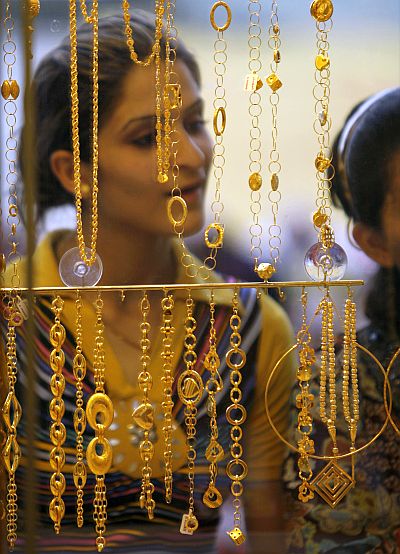 | « Back to article | Print this article |
Why gold price may touch Rs 32,100 soon
The shift towards a hawkish stand by the US Federal Reserve has kept gold prices on the edge.
It was interesting to note that market participants were unmoved by gold's safe-haven status after 16 days of partial government shutdown in the US, despite the deal offering only a temporary solution and not resolving the budget issues.
On the contrary, gold prices have reversed since then and the negative price action was compounded with hawkish comments from the Federal Reserve.
Looking at the recent dollar-denominated fluctuations in gold price, the influence has largely been from changes in monetary policy.
Click NEXT to read more…
Why gold price may touch Rs 32,100 soon
The latest minutes from the Fed have indicated that tapering would begin in the "coming months".
However, we suspect that the combination of uncertainty around budget negotiations/debt ceiling and the appointment of Janet Yellen as the Fed chief means that tapering would begin later than the market expects; and consequently the downside would be limited for gold.
The European Central Bank's rate cut and its consequence on the US dollar/euro exchange rate and the resulting effect on gold prices have also been concerns.
Here, we need to acknowledge that the rate cut underscores the high unemployment levels, protracted weakness across much of the Euro zone nations, as only the core economies have shown improvement.
Click NEXT to read more…
Why gold price may touch Rs 32,100 soon
That said, private consumption remains under pressure and the banking system is still considered fragile.
These would result in lower confidence levels among small business owners and change preferences in households' saving structures.
The hot money flow, another key factor, has shown decline in net long positions in November, according to CFTC data.
As of late October, the net longs in Comex were reported at the highest since mid-April, however, that was followed by liquidation, leading to more than $100 fall in gold price over three weeks. Exchange-traded funds (ETFs) have seen a sustained net outflow, falling to the lowest since early 2010.
Click NEXT to read more…
Why gold price may touch Rs 32,100 soon
On the positive side, we have seen central banks adding to their holdings, albeit at a pace slower than last year.
And the global demand for gold, with respect to jewellery fabrication and physical bars, is set to show growth of 15 per cent and 23 per cent, respectively, from last year, according to our estimates.
How are these factors going to translate to prices in India?
A price level in dollar terms has not been adding significance to the end consumer, as prices in India have sharply deviated from gold priced in dollar terms, not just due to weak currency but due to gold restraint policies and Customs duty, which have resulted in the Indian consumer shelling out 21 per cent more than the London fix (spot prices), not to mention the volatility in premiums.
Click NEXT to read more…
Why gold price may touch Rs 32,100 soon
This has now encouraged import of plain jewellery, by paying 15 per cent import duty. This should, to some extent, help a balancing act on premiums.
That said, the unofficial trade has only increased and become more incentivised, with grey market price just a tad higher than the customs duty of 10 per cent.
Given the kind of supply shortfall in the official market, whatever is the negative development with respect to gold price in international markets, prices in India will stay lofty, for the way the functions of price are structured.
Click NEXT to read more…
Why gold price may touch Rs 32,100 soon
Demand forces are strong, as over the next three months more weddings are likely to be organised than what was seen last year, and the income levels of rural households are likely to be higher due to better farm yields.
Thus, the unavoidable purchases would dominate this season.
This, in short, means the downside of gold in India would be limited to Rs 29,700 for 10 g (basis Mumbai spot) and was expected to test Rs 32,100 in three months (which at the time of writing is at Rs 30,800).
The author is India Analyst, GFMS Thomson Reuters.






